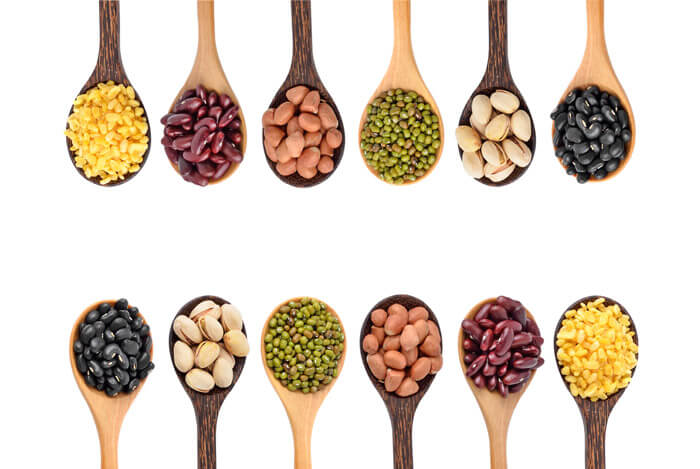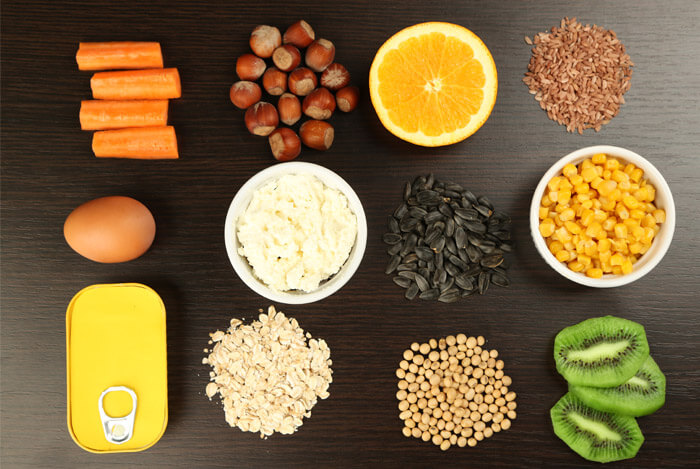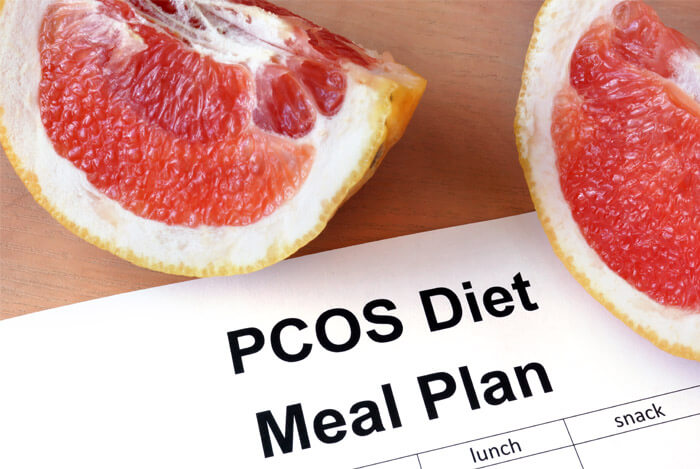Polycystic ovary syndrome (PCOS) is a condition affecting between 1 in 10 and 1 in 20 women of childbearing age. This condition causes the body’s hormones to become unbalanced, leading to issues like ovarian cysts, increased hair growth on the face and body (hirsutism), acne, weight gain or obesity, thinning hair, irregular menstrual periods, and even infertility.
Complications arising from polycystic ovary syndrome include an increased risk of type 2 diabetes, high cholesterol, metabolic syndrome, and heart conditions.
While the cause of PCOS is not fully understood, it’s thought genetics plays a role, as does excess insulin.
There is currently no cure for PCOS, although a number of techniques can be employed to help manage symptoms of the condition. Sufferers may take medication for acne, hormone regulation, diabetes, fertility etc.
- Does Diet Help With PCOS?
- The Role of Insulin
- Carbohydrates
- Sugars
- Good & Bad Fats
- Vitamin D & PCOS
- The Role of Exercise
- Sample PCOS Meal Plan
Table of Contents
Does Diet Help With PCOS?

Thankfully, more and more doctors are beginning to recognize the importance diet plays in preventing and controlling PCOS.
I’m going to look at some of the ways you can make dietary changes to manage the symptoms of PCOS.


The Role of Insulin

Insulin is thought to play a major role in PCOS. This powerful hormone, released by the pancreas, exists to transport sugar out of the blood and into the cells.
However, many women with PCOS are insulin resistant, meaning this process doesn’t work correctly within their bodies. As a result, high levels of insulin contribute to many of the symptoms of PCOS, such as weight gain, high cholesterol, diabetes, and ovarian cysts.
Ladies, you’ll be glad to hear that controlling your diet can play a huge part in helping reverse insulin resistance. Firstly, stick to a balanced diet consisting of whole grains, fruit and vegetables, healthy fats, and protein.
If you’re overweight or obese, as 50% of women with this condition are, then you should work towards shedding some pounds.
Sure, it’ll be tough. But it will be worth it.
Losing just 5% to 10% of body weight can improve symptoms of PCOS and reduce insulin resistance.

Let’s have a look at the best dietary choices to decrease insulin resistance and therefore manage PCOS symptoms.
Carbohydrates

While standard guidelines recommend that we get 45% to 65% of our daily calories from carbohydrates, women with PCOS should strive for the lower end of this range.
If you’re already insulin resistant, a lower carb diet is typically a better option.
I promise you won’t have to starve yourself to get the benefits of a lower carbohydrate intake.
Even switching to a diet consisting of 43% carbohydrates has been shown to reduce fasting insulin levels, and therefore improve insulin sensitivity, in women with PCOS.
Choose high fiber, whole grain carbohydrates like brown rice, oatmeal, whole rye, and whole wheat pasta in small amounts. Not only do whole grains have a lower GI rating, which improves insulin sensitivity, but they also help improve cholesterol levels – another PCOS-related complication.
And don’t forget the vegetables. These are always your best source of carbohydrates, so eat plenty of them.
Sugars

If you’re insulin resistant, it’s important to limit your intake of added sugars and stay active.
If you really need a sweet fix, try some low sugar fruit, like berries or melon, to curb your cravings.
Good & Bad Fats

This has to be one of my favorite topics – the importance of fats.
Dietary fat is vital in a PCOS diet as slows the release of glucose, ensuring your blood sugar levels remain relatively stable. Fat can also be important in weight management as it helps you feel full and stops overeating.
One fat you can safely reduce or cut out is trans fats, which are really unhealthy and raise LDL cholesterol (the bad kind), while reducing HDL cholesterol (the good kind). Since you’re already at risk of diabetes, heart disease, and high cholesterol from PCOS, you don’t need to add to the risk by eating these fats.
Then you can turn to other healthy fats, namely monounsaturated and polyunsaturated fats from nuts, seeds, and avocados.
No discussion on fats can leave out the importance of omega 3 fatty acids. These essential fatty acids prevent or reduce symptoms of multiple conditions, and PCOS is no exception.
They don’t just decrease cholesterol and lower blood pressure, but they have also been shown to be effective in improving hirsutism and insulin resistance in patients with PCOS.
Vitamin D & PCOS

Vitamin D deficiency has repeatedly been linked to PCOS with between 67% and 85% of PCOS sufferers lacking this important vitamin.
Not only is such a deficiency linked with numerous conditions associated with PCOS, like diabetes and heart disease, but it’s also believed to exacerbate symptoms like insulin resistance, ovulatory and menstrual irregularities, lower pregnancy success, hirsutism and obesity.
Foods rich in vitamin D include tuna, salmon, liver, eggs, and cheese. But if you live in a hot climate, don’t neglect the sunbathing, you’ll probably get most of your vitamin D needs through sun exposure.
If not, talk to your doctor and consider taking a supplement to ensure you get enough vitamin D to help alleviate your symptoms.
The Role of Exercise

Physical activity has been shown to play an important, if not essential, role in the treatment and prevention of insulin insensitivity, meaning it’s central to the management of PCOS.
Exercise also helps with weight management, prevents diabetes and heart disease, and regulates blood pressure levels and the menstrual cycle.
A 2014 study has shown that diet and exercise modifications improve fertility levels and regulate hormones of those with PCOS. In fact, exercise alone was found to have a significant impact on the symptoms of PCOS.
At least 30 minutes of aerobic activity is recommended a week. Aim for strength training twice a week, as in order to improve insulin levels and aid weight loss, lifting weights is thought to be an important aspect of exercise for those with PCOS.
In addition to regular exercise, eating whole grain carbohydrates, healthy fats, limiting sugar, and supplementing with vitamins in order to manage your PCOS, there are a few other things to consider.
- Make sure to round out your diet with protein-rich foods at every meal such as beans, nuts, eggs, fish, and lean meat.
- The GI of a food is different when eaten alone than it is when combined with other foods. If you must eat a high GI food, make sure to combine it with low GI foods to lessen the impact on blood sugar levels.
- Watch your calorie intake and exercise portion control in order to maintain a healthy weight.
Sample PCOS Meal Plan

Here’s an idea of what a typical day looks like on a PCOS friendly diet – pretty good wouldn’t you say?
Just make sure to adjust your portion size based on your calorie needs, which you can figure out here.
- Breakfast: Breakfast quiche made with spinach, mushrooms and tomatoes.
- Snack: Some low GI fruit like cherries, or a grapefruit.
- Lunch: A spiced lentil and vegetable soup – full of flavor and protein.
- Snack: A mixed berry smoothie with almond milk & whey protein.
- Dinner: Grilled salmon with pineapple mango salsa served with a side of wild rice.









